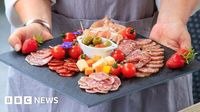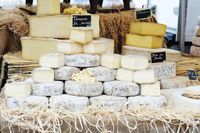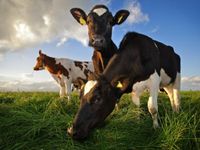British tourists returning from Europe will face new restrictions this Easter weekend, as the UK government has implemented a ban on bringing back meat and dairy products. This decision comes in response to rising cases of foot-and-mouth disease across the continent, a highly infectious virus that can severely impact livestock.
Under the new regulations, travellers will be prohibited from bringing back a variety of products, including beef, pork, lamb, mutton, venison, goat meat, and all dairy items. This restriction means that even small amounts of cheese or cured meats, such as a wedge of French brie or a German sausage, cannot be brought back to the UK as gifts or for personal consumption.
The government has advised those planning to travel over the Easter weekend to check the new rules before they depart. A post on the government’s official account on X, previously known as Twitter, emphasized that the measures are intended to protect British farmers from the potential spread of the disease. Currently, there are no reported cases of foot-and-mouth disease in the UK.
Farming Minister Daniel Zeichner stated, "This government will do whatever it takes to protect British farmers from foot and mouth. That is why we are further strengthening protections by introducing restrictions on personal meat and dairy imports to prevent the spread of the disease and protect Britain’s food security." The Port of Dover anticipates a busy weekend, expecting to process around 5,500 cars embarking on outbound ferry sailings between 6am and 1pm on Good Friday.
According to aviation analytics company Cirium, a total of 11,282 flights are scheduled to depart from UK airports between Good Friday and Easter Monday, indicating a strong desire among British tourists to travel despite the new restrictions.
Travellers should be aware that declared goods will be seized and destroyed by Border Force officers at customs, and those caught with undeclared meat or cheese could face prosecution or fines of up to £5,000. This ban is the latest in a series of post-Brexit challenges for UK travellers, including restrictions on the amount of alcohol they can bring back from the EU. Previously, holidaymakers could return with unlimited quantities of wine, but now they are limited to 18 litres or 24 bottles. For beer, the limit stands at 42 litres.
Liberal Democrat MP Caroline Voaden expressed concern over the government’s approach, referencing the chilling memories of the 2001 foot-and-mouth outbreak in the UK, which led to the culling of over six million animals. She pointed out that the government has yet to negotiate a veterinary agreement with the EU, which she believes is essential for long-term biosecurity. Voaden stated, "Let’s be clear: this is a blunt move which won’t help to secure our long-term biosecurity. While no one wants to see foot-and-mouth on our shores again, the government must realize that these bans are not the solution. We urgently need a veterinary agreement with the EU, not just to boost biosecurity, but to slash the red tape our farmers and fishers deal with every time they want to export to our biggest trading partner."
The temporary ban on meat and dairy imports is not limited to the UK. The Isle of Man has also introduced similar restrictions for travellers returning from the EU and European Economic Area. The Isle of Man Government has implemented its ban in line with the UK, aiming to prevent the spread of foot-and-mouth disease. The restrictions apply to all meat from cattle, sheep, goats, and pigs, as well as dairy products, including sandwiches and cheese bought at airports or duty-free.
Chief Veterinary Officer Dr. Amy Beckett emphasized the importance of these enhanced restrictions, stating, "These enhanced restrictions are a crucial step in protecting our agricultural industry. I would urge livestock keepers to exercise the utmost vigilance for signs of disease, follow strict biosecurity measures, and report any suspicions to DEFA immediately." Anyone suspecting an outbreak is encouraged to contact the Department of Environment, Food and Agriculture.
As the Easter holiday approaches, British travellers are reminded to stay informed about the new regulations that could impact their plans. While the government maintains that these measures are necessary for safeguarding the nation’s livestock, the implications for holidaymakers and the food and drink industry are significant. The Guild of Fine Food, representing independent food and drink retailers, noted that the ban on holiday treats was "hurried" but recognized the need to protect farmers and ensure biosecurity.
John Farrand, managing director of the Guild of Fine Food, commented on the situation, stating, "The food and drink industry absolutely supports the fact that we must protect our farmers and that biosecurity is paramount. However, the bureaucracy brought in after Brexit has added significant constraints for small food and drink importers and exporters."
As the situation develops, it remains to be seen how these restrictions will affect both travellers and the agricultural sector in the UK. With the Easter weekend fast approaching, many will be watching closely to see how these new regulations are enforced and what further measures might be needed to ensure the safety of the country’s livestock.






